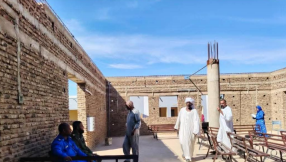During the current school half term, with up to 3.2 million children facing the prospect of not having enough food to eat, new research has highlighted the importance of church volunteers when it comes to filling the 'holiday hunger' gap.
A researcher at the University of Bristol, Stephanie Denning, teamed up with the charity MakeLunch to understand how Christian church groups are responding to the growing problem.
Recent figures show that 1.2 million UK children receive free school meals which are means tested, while a further two million children who are not eligible for free school meals are part of families who are still experiencing poverty.
According to research commissioned by Church Urban Fund, one in 50 (two per cent of) British adults say they used a food bank during 2016. Five per cent of adults surveyed reported that in the past year they had gone without meals as they were unable to afford food, and 13 per cent said they had experienced anxiety or worry about being able to afford enough food for themselves and their family during 2016.
MakeLunch is a network of churches and community groups running 'lunch kitchens' to fill the holiday hunger gap by providing the equivalent of a free school meal during the school holidays. Since it was established in July 2011, the charity has cooked and served over 65,000 meals in more than 100 locations across England, Scotland and Wales.
Denning conducted the research over a three-year period, analysing the experiences of the people who volunteered with a MakeLunch project she established.
The research has found that faith groups and volunteers are playing a crucial role in responding to food poverty by running food banks and children's holiday groups, through to collecting evidence and campaigning for change.
It showed that people's motivations to volunteer ranged from Biblical teaching on responding to hunger, through to anger at political reform and wanting to do something active and meaningful in response.
Denning said: 'The voluntary sector has become an increasingly important part of welfare provision in UK society, and so there's never been a more crucial time to try and understand it.
'A key motivation for volunteers was obviously to respond to children's holiday hunger, and volunteers needed to feel this was being met, but there was also a hope it would be an enjoyable and rewarding experience.
'As more and more groups depend upon volunteers to provide services for society we need greater understanding of how volunteering functions; it is not just the traditional client or recipient that can benefit. To continue giving their time, the volunteer must also feel the benefit too.'
The director of MakeLunch, Rachel Warwick, said: 'At MakeLunch we're committed to equipping and mobilising churches to serve families in their own communities. We're dependent on volunteers to meet this need and Stephanie's research has been invaluable both as we've developed this centrally but also in training our team leaders at our national conference.'
In August, Christian Today reported how bishops and more than 100 MPs were backing a bill that suggested using 10 per cent of the money raised by a sugary drinks tax to force councils to provide food and activities for children who would otherwise go without.
The third most senior figure in the Church of England, the Bishop of Durham, alongside the Bishop of Liverpool backed the move introduced by Labour MP Frank Field.
And also in August, Christian Today reported comments from a range of church volunteers on how churches were helping with an overwhelming demand for food banks and help.













